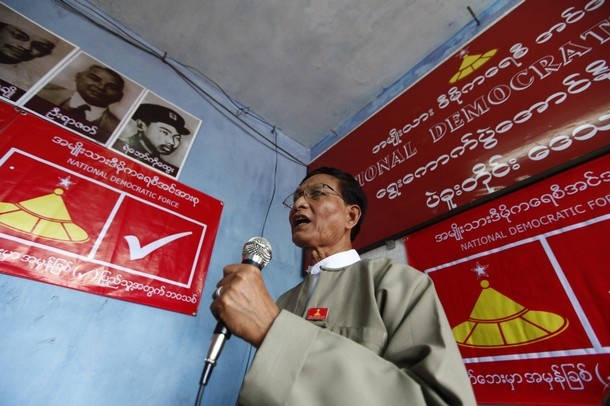The National Democratic Front (NDF) is planning to propose a law to “protect” Buddhist women entering interfaith marriages in Burma during this session of parliament, a party spokesperson has confirmed to DVB.
It comes amid reports that a number of its grassroots members are actively helping the ultra-nationalist “969” movement collect signatures in support of a controversial law, which would require Buddhist women to seek official approval before marrying a Muslim man.
But NDF leader Khin Maung Swe insisted that their law will be “a bit different” from the monks’ proposal and will not violate human rights, although he refused to condemn their campaign.
“Their proposal tries to ban Myanmar [Burmese] Buddhist women from getting married to other possible religious persons, but in our proposal there will not be that kind of a ban,” he said, highlighting a woman’s right to inheritance and religious freedom as the main issues.
But he conceded that there “may be some limitations, or steps to carry out before getting married” and echoed concerns voiced by “969” leader Wirathu about Muslim men spreading their faith by marrying Buddhist women.
“In our society we are too poor to earn a living, that’s why persons from different religion take advantage of that and get married to Myanmar Buddhist women,” he warned. “After they get married to such kind of man, they lose their link to their own society; they lose their natural rights and human rights.”
Although it has not yet been drafted, the NDF’s proposal will be presented to parliament in the next two weeks in the hopes of starting a parliamentary discussion about interfaith marriages. The party also wants to amend a 1954 law, which outlines existing protections for Buddhist women marrying men of a different faith, for “contemporary relevance”.
“We want to show the public that our society needs a law to protect women’s rights regarding marriage to a person with different religion,” he said.
But women’s groups say that politicians should focus their attention on improving women’s social and economic rights across the board, instead of focusing on interfaith marriages.
“Rather than proposing the ban on interfaith marriage, we need to focus on women’s protection laws, like domestic violence, crime and rape. But nobody’s talking about that,” Shenn Lei, co-founder of the RAINFALL Gender Study Group, told DVB.
The Organisation for Economic Co-operation and Development (OECD) describes violence against women as “one of the most pressing human rights violations” in Burma. It is one of only two countries among the Association of Southeast Asian Nations that does not have a specific law banning domestic violence.
Although women’s groups, including RAINFALL, plan to lobby against any law restricting women’s marital autonomy, Shenn Lei worried that it may still obtain popular support.
“The majority of the population wanted to agree on [the monks’] law [so] for the political parties this is one of the ways they are collecting votes,” she said, adding that even if many women oppose it, they might not “dare to speak out”.
Some women report being abused and harassed on social media after speaking out against the ban, while a leading monk has threatened to rally against any politician, who votes against their proposal, in the crucial 2015 general elections.
The interfaith marriage ban, also known as the “national race protection law”, has garnered significant backing across the country and fuelled Wirathu’s “969” campaign, which calls for Buddhists to boycott Muslim businesses.
In an interview on Tuesday, the ruling military-backed party’s vice-chair, Htay Oo, told DVB that the “national race protection law” sounded “noble”. Meanwhile, dozens of grassroots NDF members rallied on the streets of Mandalay last week in a bid to muster support for the monks’ legislation.
According to a report in the Wall Street Journal, another NDF executive, Kyaw Thura, admitted that party members “have been participating in discussions on the marriage law and supporting it.” Khin Maung Swe has also courted controversy by praising the government’s two-child limit for Rohingya Muslims in western Burma, and insisting that the issue should not just be viewed from a “human rights point of view.”
Burma has seen a rise in religious tensions since last year, when Buddhists clashed with Rohingya Muslims in Arakan state, displacing some 140,000 people and killing over 200. Since March, renewed bouts of anti-Muslim violence have claimed another 44 lives.
The NDF split from Aung San Suu Kyi’s National League for Democracy in 2010, after falling out with the democracy icon over whether to participate in the contested general election.



